Business Law: Directors' Duties, Responsibilities, and Case Analysis
VerifiedAdded on 2023/01/16
|11
|3306
|1
Report
AI Summary
This report provides a comprehensive overview of the legal duties and responsibilities of company directors within the framework of business law, with a specific focus on fiduciary duties. It delves into the definition of a fiduciary, highlighting the obligations of loyalty, care, and obedience that directors owe to their companies. The report examines the relevant sections of the Corporations Act, including sections 180 to 183, which outline the duties of care and diligence, good faith, proper use of position, and the prohibition of using confidential information for personal gain. Additional statutory duties, such as those related to insolvency and financial record-keeping, are also discussed. Furthermore, the report explores the duties directors have under other laws, such as employment and taxation laws, while emphasizing the significance of fiduciary duties. The report also addresses the Business Judgment Rule and the individuals to whom directors owe a duty, including shareholders, creditors, and employees. The report references the case of Vanguard Financial Planners Pty Ltd & Anor v Ale & Ors, to illustrate the practical application of these legal principles. This report is a valuable resource for students seeking to understand the complexities of corporate governance and the responsibilities of company directors.
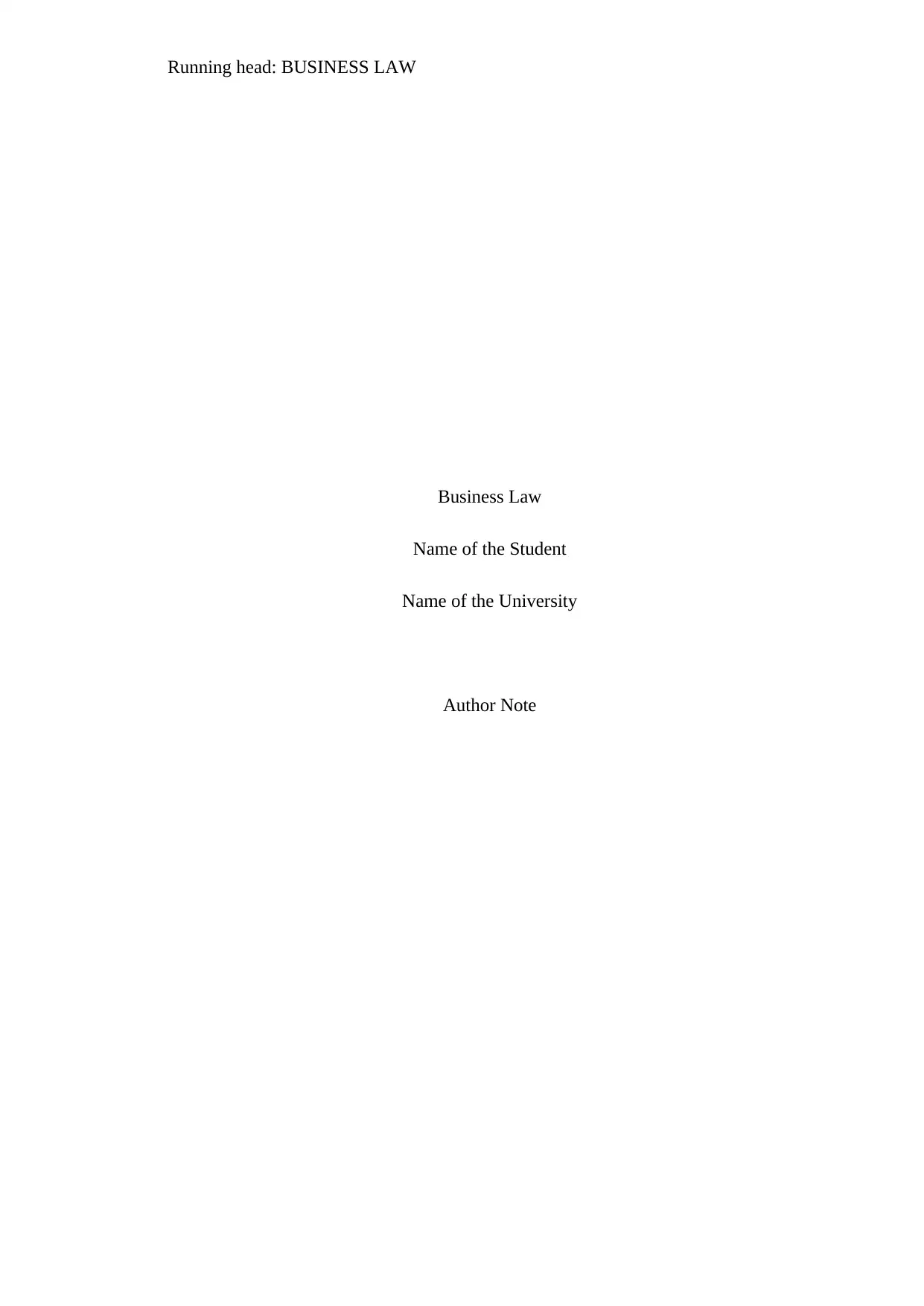
Running head: BUSINESS LAW
Business Law
Name of the Student
Name of the University
Author Note
Business Law
Name of the Student
Name of the University
Author Note
Paraphrase This Document
Need a fresh take? Get an instant paraphrase of this document with our AI Paraphraser
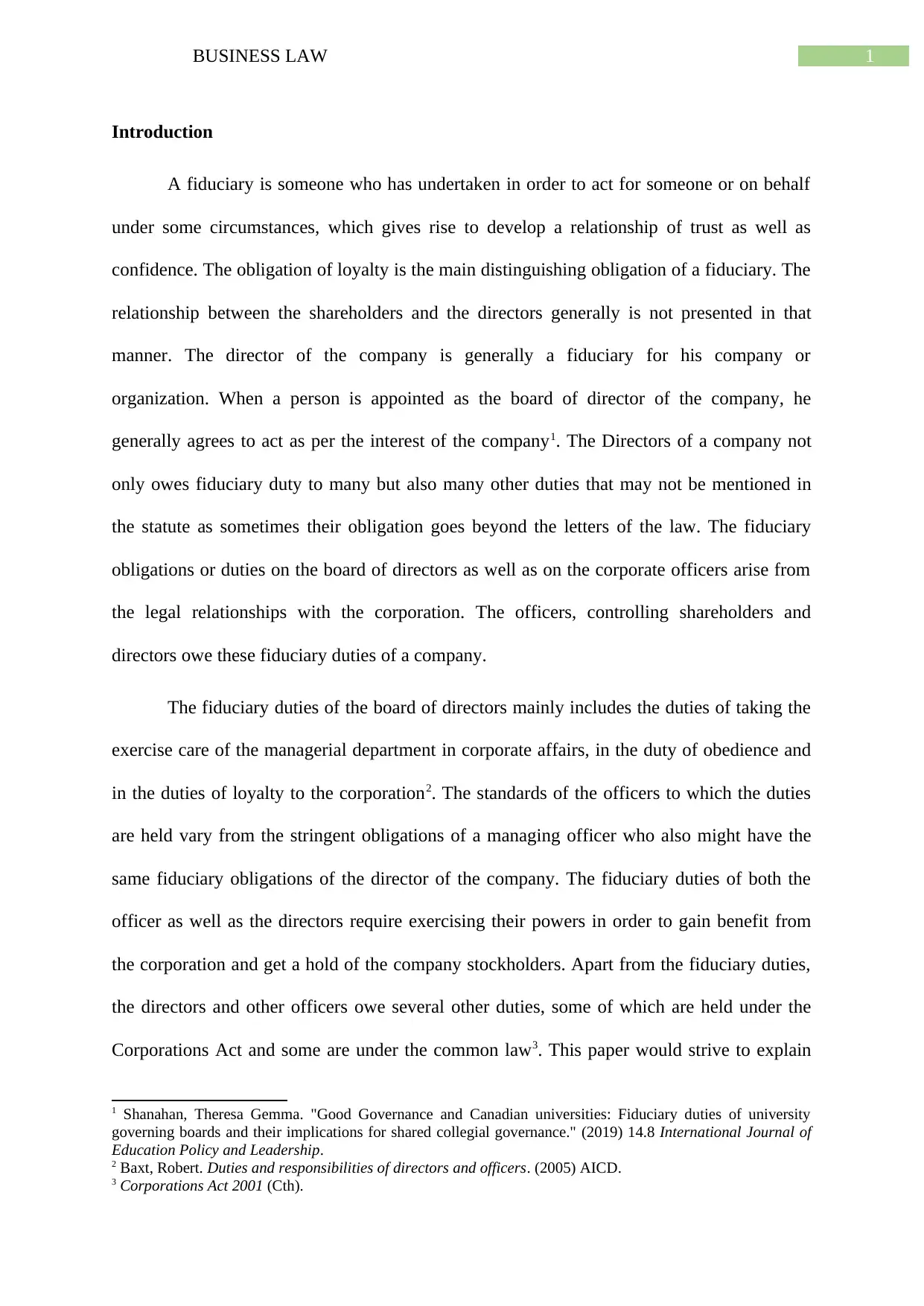
1BUSINESS LAW
Introduction
A fiduciary is someone who has undertaken in order to act for someone or on behalf
under some circumstances, which gives rise to develop a relationship of trust as well as
confidence. The obligation of loyalty is the main distinguishing obligation of a fiduciary. The
relationship between the shareholders and the directors generally is not presented in that
manner. The director of the company is generally a fiduciary for his company or
organization. When a person is appointed as the board of director of the company, he
generally agrees to act as per the interest of the company1. The Directors of a company not
only owes fiduciary duty to many but also many other duties that may not be mentioned in
the statute as sometimes their obligation goes beyond the letters of the law. The fiduciary
obligations or duties on the board of directors as well as on the corporate officers arise from
the legal relationships with the corporation. The officers, controlling shareholders and
directors owe these fiduciary duties of a company.
The fiduciary duties of the board of directors mainly includes the duties of taking the
exercise care of the managerial department in corporate affairs, in the duty of obedience and
in the duties of loyalty to the corporation2. The standards of the officers to which the duties
are held vary from the stringent obligations of a managing officer who also might have the
same fiduciary obligations of the director of the company. The fiduciary duties of both the
officer as well as the directors require exercising their powers in order to gain benefit from
the corporation and get a hold of the company stockholders. Apart from the fiduciary duties,
the directors and other officers owe several other duties, some of which are held under the
Corporations Act and some are under the common law3. This paper would strive to explain
1 Shanahan, Theresa Gemma. "Good Governance and Canadian universities: Fiduciary duties of university
governing boards and their implications for shared collegial governance." (2019) 14.8 International Journal of
Education Policy and Leadership.
2 Baxt, Robert. Duties and responsibilities of directors and officers. (2005) AICD.
3 Corporations Act 2001 (Cth).
Introduction
A fiduciary is someone who has undertaken in order to act for someone or on behalf
under some circumstances, which gives rise to develop a relationship of trust as well as
confidence. The obligation of loyalty is the main distinguishing obligation of a fiduciary. The
relationship between the shareholders and the directors generally is not presented in that
manner. The director of the company is generally a fiduciary for his company or
organization. When a person is appointed as the board of director of the company, he
generally agrees to act as per the interest of the company1. The Directors of a company not
only owes fiduciary duty to many but also many other duties that may not be mentioned in
the statute as sometimes their obligation goes beyond the letters of the law. The fiduciary
obligations or duties on the board of directors as well as on the corporate officers arise from
the legal relationships with the corporation. The officers, controlling shareholders and
directors owe these fiduciary duties of a company.
The fiduciary duties of the board of directors mainly includes the duties of taking the
exercise care of the managerial department in corporate affairs, in the duty of obedience and
in the duties of loyalty to the corporation2. The standards of the officers to which the duties
are held vary from the stringent obligations of a managing officer who also might have the
same fiduciary obligations of the director of the company. The fiduciary duties of both the
officer as well as the directors require exercising their powers in order to gain benefit from
the corporation and get a hold of the company stockholders. Apart from the fiduciary duties,
the directors and other officers owe several other duties, some of which are held under the
Corporations Act and some are under the common law3. This paper would strive to explain
1 Shanahan, Theresa Gemma. "Good Governance and Canadian universities: Fiduciary duties of university
governing boards and their implications for shared collegial governance." (2019) 14.8 International Journal of
Education Policy and Leadership.
2 Baxt, Robert. Duties and responsibilities of directors and officers. (2005) AICD.
3 Corporations Act 2001 (Cth).
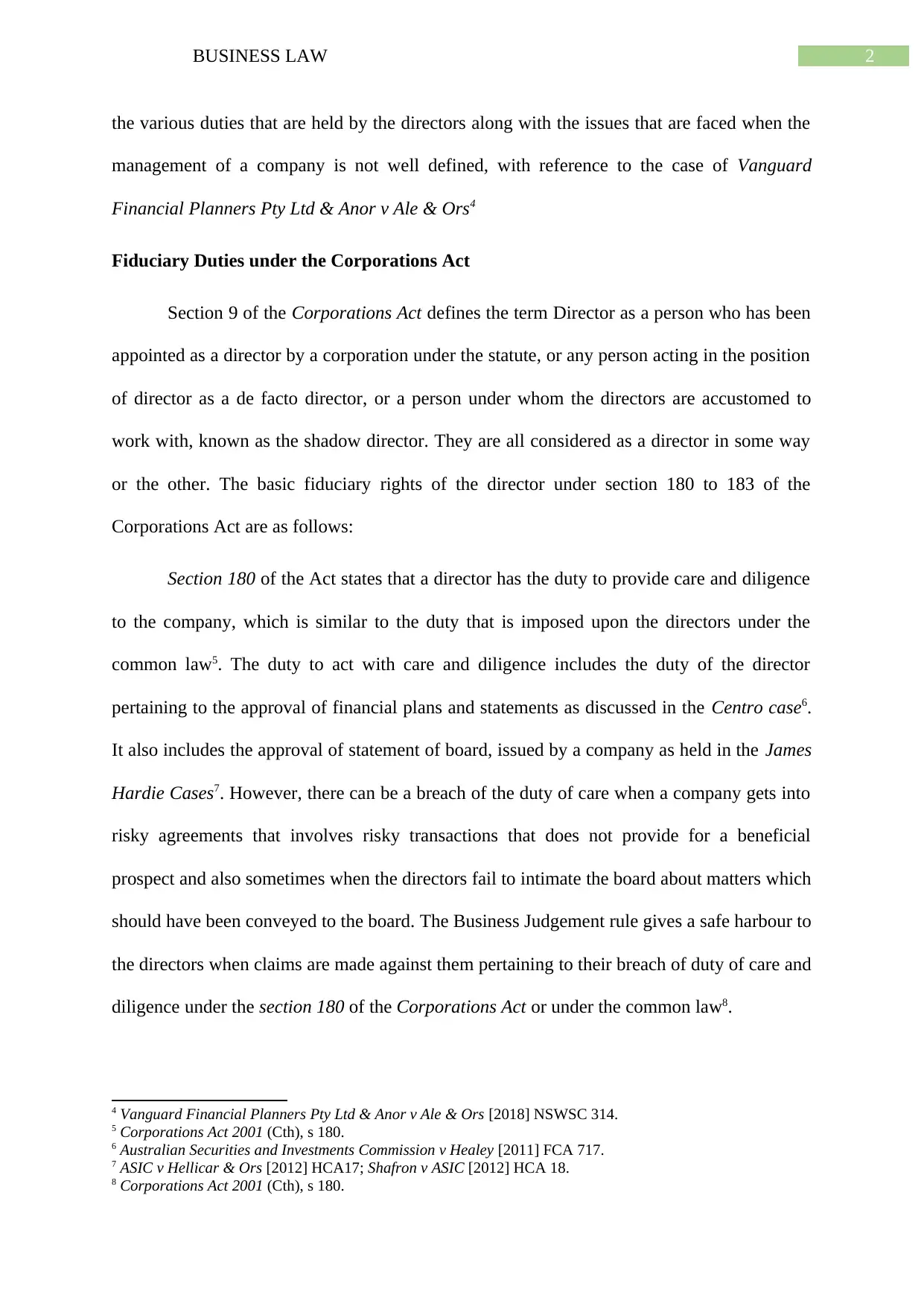
2BUSINESS LAW
the various duties that are held by the directors along with the issues that are faced when the
management of a company is not well defined, with reference to the case of Vanguard
Financial Planners Pty Ltd & Anor v Ale & Ors4
Fiduciary Duties under the Corporations Act
Section 9 of the Corporations Act defines the term Director as a person who has been
appointed as a director by a corporation under the statute, or any person acting in the position
of director as a de facto director, or a person under whom the directors are accustomed to
work with, known as the shadow director. They are all considered as a director in some way
or the other. The basic fiduciary rights of the director under section 180 to 183 of the
Corporations Act are as follows:
Section 180 of the Act states that a director has the duty to provide care and diligence
to the company, which is similar to the duty that is imposed upon the directors under the
common law5. The duty to act with care and diligence includes the duty of the director
pertaining to the approval of financial plans and statements as discussed in the Centro case6.
It also includes the approval of statement of board, issued by a company as held in the James
Hardie Cases7. However, there can be a breach of the duty of care when a company gets into
risky agreements that involves risky transactions that does not provide for a beneficial
prospect and also sometimes when the directors fail to intimate the board about matters which
should have been conveyed to the board. The Business Judgement rule gives a safe harbour to
the directors when claims are made against them pertaining to their breach of duty of care and
diligence under the section 180 of the Corporations Act or under the common law8.
4 Vanguard Financial Planners Pty Ltd & Anor v Ale & Ors [2018] NSWSC 314.
5 Corporations Act 2001 (Cth), s 180.
6 Australian Securities and Investments Commission v Healey [2011] FCA 717.
7 ASIC v Hellicar & Ors [2012] HCA17; Shafron v ASIC [2012] HCA 18.
8 Corporations Act 2001 (Cth), s 180.
the various duties that are held by the directors along with the issues that are faced when the
management of a company is not well defined, with reference to the case of Vanguard
Financial Planners Pty Ltd & Anor v Ale & Ors4
Fiduciary Duties under the Corporations Act
Section 9 of the Corporations Act defines the term Director as a person who has been
appointed as a director by a corporation under the statute, or any person acting in the position
of director as a de facto director, or a person under whom the directors are accustomed to
work with, known as the shadow director. They are all considered as a director in some way
or the other. The basic fiduciary rights of the director under section 180 to 183 of the
Corporations Act are as follows:
Section 180 of the Act states that a director has the duty to provide care and diligence
to the company, which is similar to the duty that is imposed upon the directors under the
common law5. The duty to act with care and diligence includes the duty of the director
pertaining to the approval of financial plans and statements as discussed in the Centro case6.
It also includes the approval of statement of board, issued by a company as held in the James
Hardie Cases7. However, there can be a breach of the duty of care when a company gets into
risky agreements that involves risky transactions that does not provide for a beneficial
prospect and also sometimes when the directors fail to intimate the board about matters which
should have been conveyed to the board. The Business Judgement rule gives a safe harbour to
the directors when claims are made against them pertaining to their breach of duty of care and
diligence under the section 180 of the Corporations Act or under the common law8.
4 Vanguard Financial Planners Pty Ltd & Anor v Ale & Ors [2018] NSWSC 314.
5 Corporations Act 2001 (Cth), s 180.
6 Australian Securities and Investments Commission v Healey [2011] FCA 717.
7 ASIC v Hellicar & Ors [2012] HCA17; Shafron v ASIC [2012] HCA 18.
8 Corporations Act 2001 (Cth), s 180.
⊘ This is a preview!⊘
Do you want full access?
Subscribe today to unlock all pages.

Trusted by 1+ million students worldwide
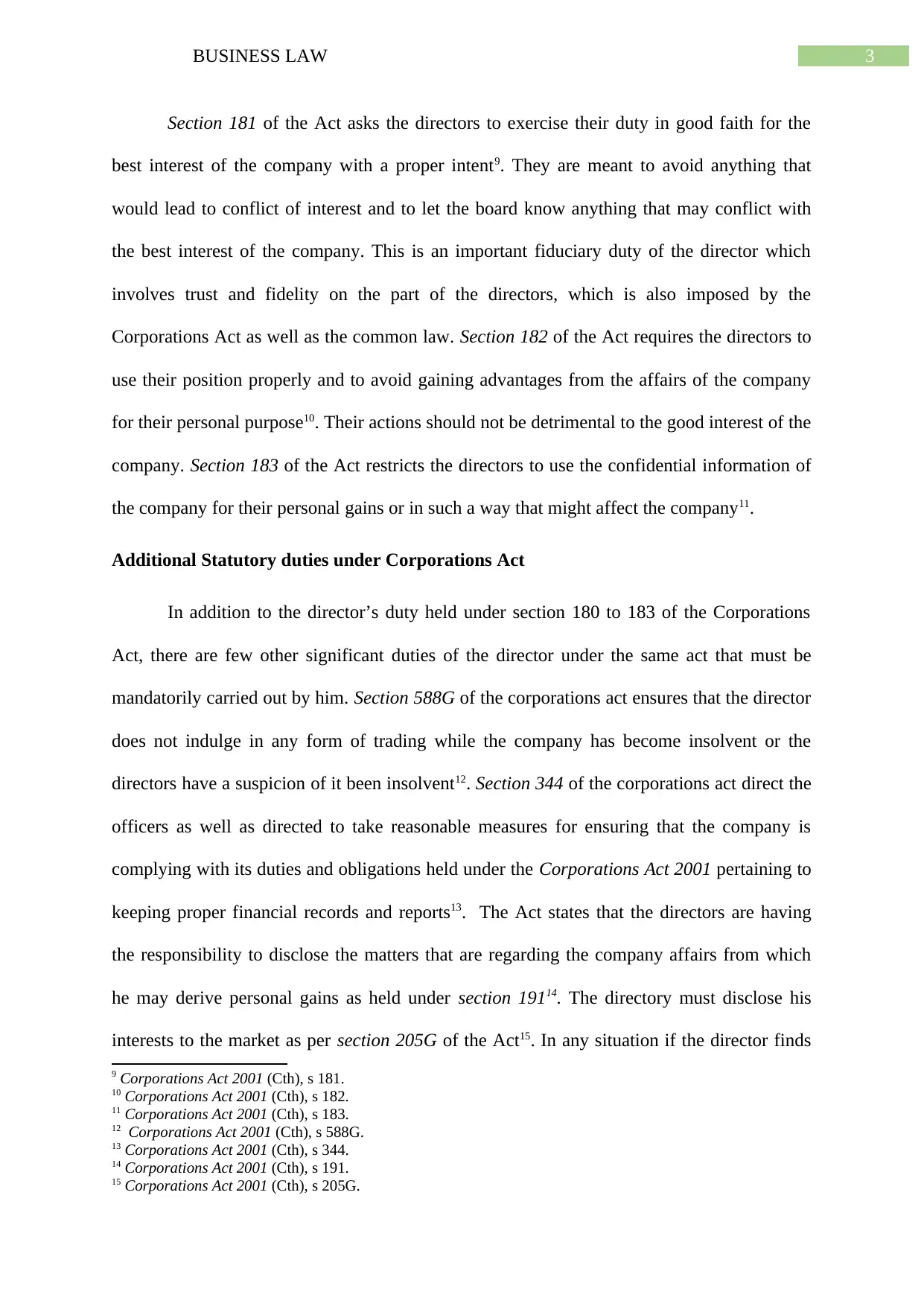
3BUSINESS LAW
Section 181 of the Act asks the directors to exercise their duty in good faith for the
best interest of the company with a proper intent9. They are meant to avoid anything that
would lead to conflict of interest and to let the board know anything that may conflict with
the best interest of the company. This is an important fiduciary duty of the director which
involves trust and fidelity on the part of the directors, which is also imposed by the
Corporations Act as well as the common law. Section 182 of the Act requires the directors to
use their position properly and to avoid gaining advantages from the affairs of the company
for their personal purpose10. Their actions should not be detrimental to the good interest of the
company. Section 183 of the Act restricts the directors to use the confidential information of
the company for their personal gains or in such a way that might affect the company11.
Additional Statutory duties under Corporations Act
In addition to the director’s duty held under section 180 to 183 of the Corporations
Act, there are few other significant duties of the director under the same act that must be
mandatorily carried out by him. Section 588G of the corporations act ensures that the director
does not indulge in any form of trading while the company has become insolvent or the
directors have a suspicion of it been insolvent12. Section 344 of the corporations act direct the
officers as well as directed to take reasonable measures for ensuring that the company is
complying with its duties and obligations held under the Corporations Act 2001 pertaining to
keeping proper financial records and reports13. The Act states that the directors are having
the responsibility to disclose the matters that are regarding the company affairs from which
he may derive personal gains as held under section 19114. The directory must disclose his
interests to the market as per section 205G of the Act15. In any situation if the director finds
9 Corporations Act 2001 (Cth), s 181.
10 Corporations Act 2001 (Cth), s 182.
11 Corporations Act 2001 (Cth), s 183.
12 Corporations Act 2001 (Cth), s 588G.
13 Corporations Act 2001 (Cth), s 344.
14 Corporations Act 2001 (Cth), s 191.
15 Corporations Act 2001 (Cth), s 205G.
Section 181 of the Act asks the directors to exercise their duty in good faith for the
best interest of the company with a proper intent9. They are meant to avoid anything that
would lead to conflict of interest and to let the board know anything that may conflict with
the best interest of the company. This is an important fiduciary duty of the director which
involves trust and fidelity on the part of the directors, which is also imposed by the
Corporations Act as well as the common law. Section 182 of the Act requires the directors to
use their position properly and to avoid gaining advantages from the affairs of the company
for their personal purpose10. Their actions should not be detrimental to the good interest of the
company. Section 183 of the Act restricts the directors to use the confidential information of
the company for their personal gains or in such a way that might affect the company11.
Additional Statutory duties under Corporations Act
In addition to the director’s duty held under section 180 to 183 of the Corporations
Act, there are few other significant duties of the director under the same act that must be
mandatorily carried out by him. Section 588G of the corporations act ensures that the director
does not indulge in any form of trading while the company has become insolvent or the
directors have a suspicion of it been insolvent12. Section 344 of the corporations act direct the
officers as well as directed to take reasonable measures for ensuring that the company is
complying with its duties and obligations held under the Corporations Act 2001 pertaining to
keeping proper financial records and reports13. The Act states that the directors are having
the responsibility to disclose the matters that are regarding the company affairs from which
he may derive personal gains as held under section 19114. The directory must disclose his
interests to the market as per section 205G of the Act15. In any situation if the director finds
9 Corporations Act 2001 (Cth), s 181.
10 Corporations Act 2001 (Cth), s 182.
11 Corporations Act 2001 (Cth), s 183.
12 Corporations Act 2001 (Cth), s 588G.
13 Corporations Act 2001 (Cth), s 344.
14 Corporations Act 2001 (Cth), s 191.
15 Corporations Act 2001 (Cth), s 205G.
Paraphrase This Document
Need a fresh take? Get an instant paraphrase of this document with our AI Paraphraser
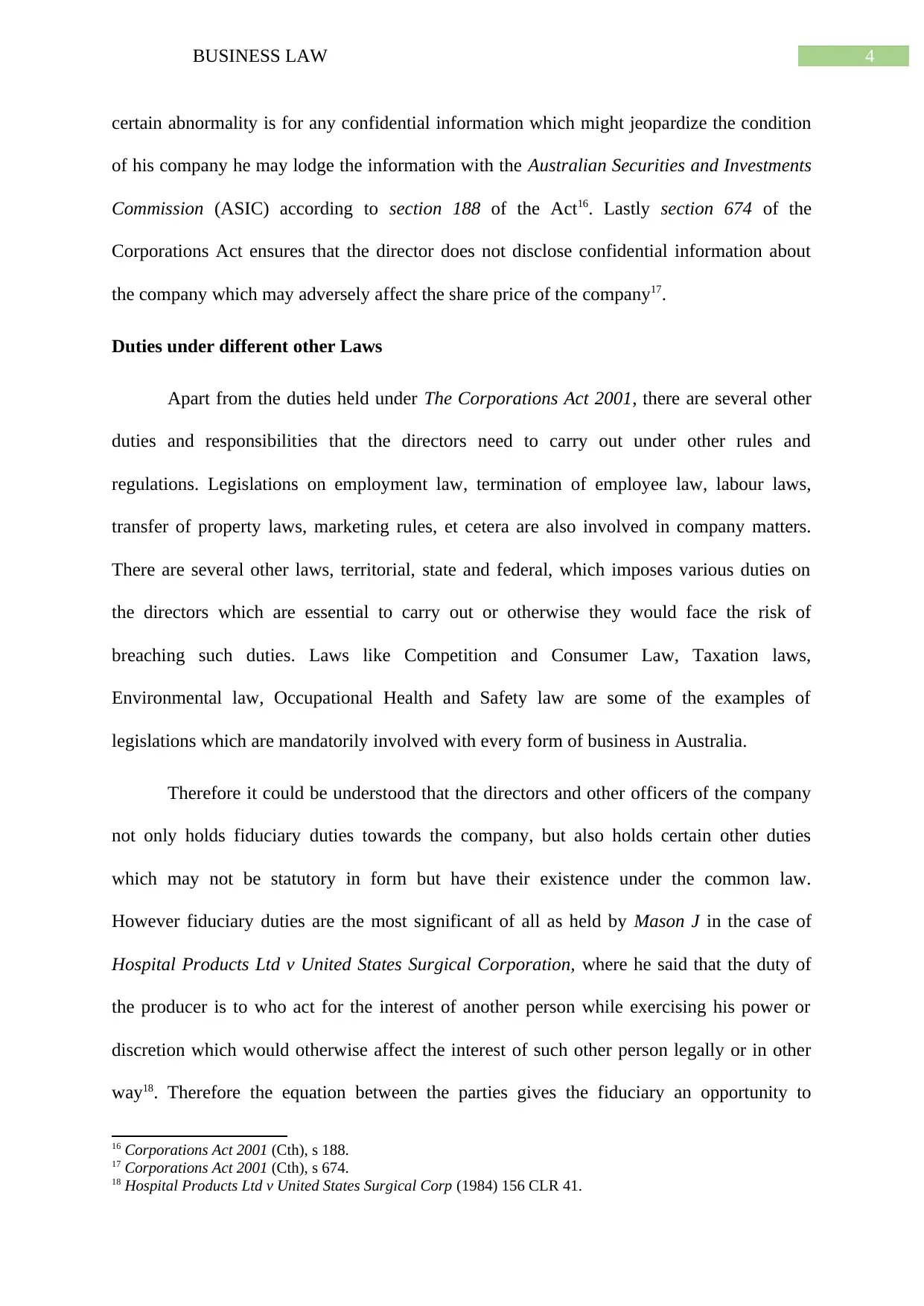
4BUSINESS LAW
certain abnormality is for any confidential information which might jeopardize the condition
of his company he may lodge the information with the Australian Securities and Investments
Commission (ASIC) according to section 188 of the Act16. Lastly section 674 of the
Corporations Act ensures that the director does not disclose confidential information about
the company which may adversely affect the share price of the company17.
Duties under different other Laws
Apart from the duties held under The Corporations Act 2001, there are several other
duties and responsibilities that the directors need to carry out under other rules and
regulations. Legislations on employment law, termination of employee law, labour laws,
transfer of property laws, marketing rules, et cetera are also involved in company matters.
There are several other laws, territorial, state and federal, which imposes various duties on
the directors which are essential to carry out or otherwise they would face the risk of
breaching such duties. Laws like Competition and Consumer Law, Taxation laws,
Environmental law, Occupational Health and Safety law are some of the examples of
legislations which are mandatorily involved with every form of business in Australia.
Therefore it could be understood that the directors and other officers of the company
not only holds fiduciary duties towards the company, but also holds certain other duties
which may not be statutory in form but have their existence under the common law.
However fiduciary duties are the most significant of all as held by Mason J in the case of
Hospital Products Ltd v United States Surgical Corporation, where he said that the duty of
the producer is to who act for the interest of another person while exercising his power or
discretion which would otherwise affect the interest of such other person legally or in other
way18. Therefore the equation between the parties gives the fiduciary an opportunity to
16 Corporations Act 2001 (Cth), s 188.
17 Corporations Act 2001 (Cth), s 674.
18 Hospital Products Ltd v United States Surgical Corp (1984) 156 CLR 41.
certain abnormality is for any confidential information which might jeopardize the condition
of his company he may lodge the information with the Australian Securities and Investments
Commission (ASIC) according to section 188 of the Act16. Lastly section 674 of the
Corporations Act ensures that the director does not disclose confidential information about
the company which may adversely affect the share price of the company17.
Duties under different other Laws
Apart from the duties held under The Corporations Act 2001, there are several other
duties and responsibilities that the directors need to carry out under other rules and
regulations. Legislations on employment law, termination of employee law, labour laws,
transfer of property laws, marketing rules, et cetera are also involved in company matters.
There are several other laws, territorial, state and federal, which imposes various duties on
the directors which are essential to carry out or otherwise they would face the risk of
breaching such duties. Laws like Competition and Consumer Law, Taxation laws,
Environmental law, Occupational Health and Safety law are some of the examples of
legislations which are mandatorily involved with every form of business in Australia.
Therefore it could be understood that the directors and other officers of the company
not only holds fiduciary duties towards the company, but also holds certain other duties
which may not be statutory in form but have their existence under the common law.
However fiduciary duties are the most significant of all as held by Mason J in the case of
Hospital Products Ltd v United States Surgical Corporation, where he said that the duty of
the producer is to who act for the interest of another person while exercising his power or
discretion which would otherwise affect the interest of such other person legally or in other
way18. Therefore the equation between the parties gives the fiduciary an opportunity to
16 Corporations Act 2001 (Cth), s 188.
17 Corporations Act 2001 (Cth), s 674.
18 Hospital Products Ltd v United States Surgical Corp (1984) 156 CLR 41.
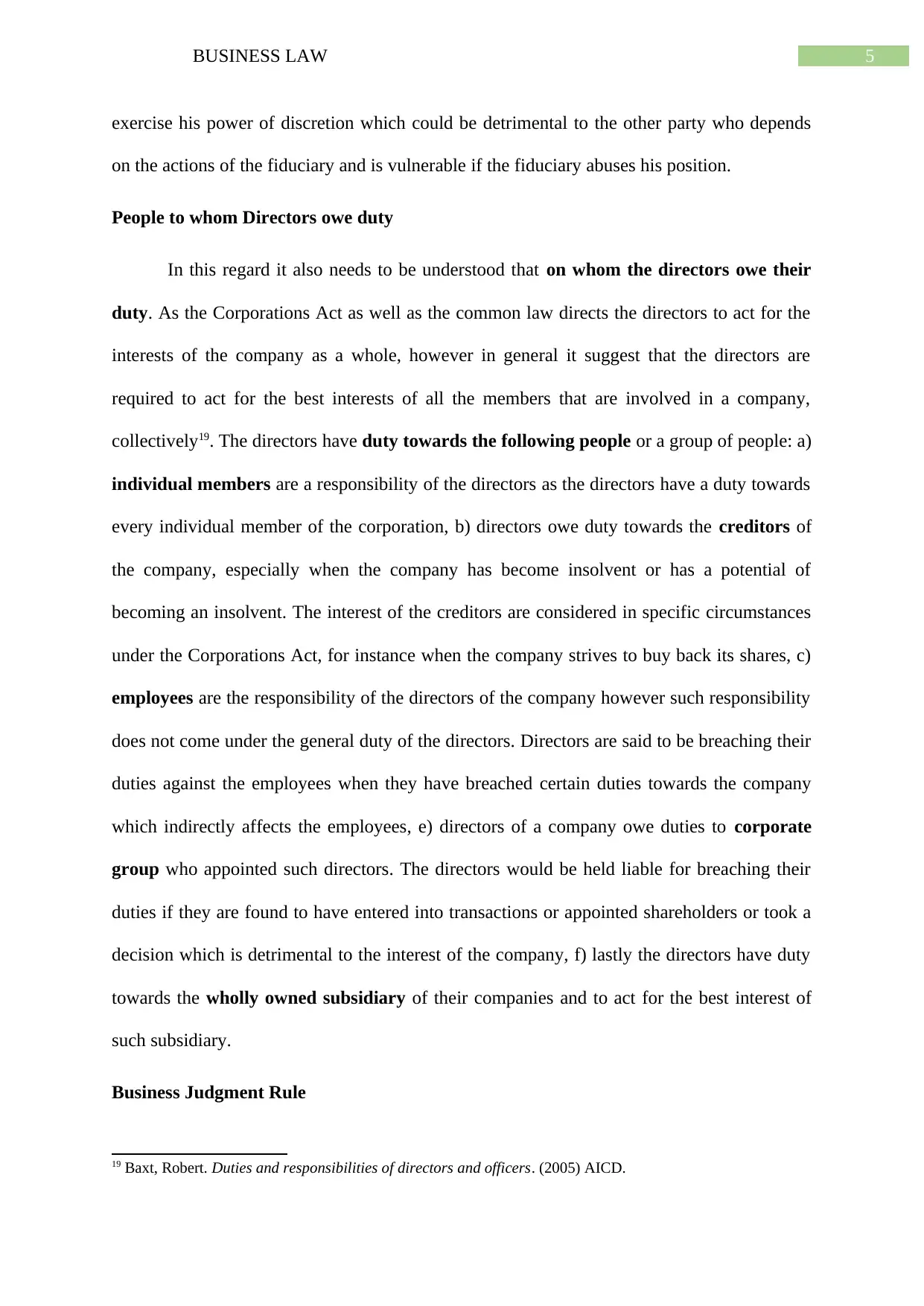
5BUSINESS LAW
exercise his power of discretion which could be detrimental to the other party who depends
on the actions of the fiduciary and is vulnerable if the fiduciary abuses his position.
People to whom Directors owe duty
In this regard it also needs to be understood that on whom the directors owe their
duty. As the Corporations Act as well as the common law directs the directors to act for the
interests of the company as a whole, however in general it suggest that the directors are
required to act for the best interests of all the members that are involved in a company,
collectively19. The directors have duty towards the following people or a group of people: a)
individual members are a responsibility of the directors as the directors have a duty towards
every individual member of the corporation, b) directors owe duty towards the creditors of
the company, especially when the company has become insolvent or has a potential of
becoming an insolvent. The interest of the creditors are considered in specific circumstances
under the Corporations Act, for instance when the company strives to buy back its shares, c)
employees are the responsibility of the directors of the company however such responsibility
does not come under the general duty of the directors. Directors are said to be breaching their
duties against the employees when they have breached certain duties towards the company
which indirectly affects the employees, e) directors of a company owe duties to corporate
group who appointed such directors. The directors would be held liable for breaching their
duties if they are found to have entered into transactions or appointed shareholders or took a
decision which is detrimental to the interest of the company, f) lastly the directors have duty
towards the wholly owned subsidiary of their companies and to act for the best interest of
such subsidiary.
Business Judgment Rule
19 Baxt, Robert. Duties and responsibilities of directors and officers. (2005) AICD.
exercise his power of discretion which could be detrimental to the other party who depends
on the actions of the fiduciary and is vulnerable if the fiduciary abuses his position.
People to whom Directors owe duty
In this regard it also needs to be understood that on whom the directors owe their
duty. As the Corporations Act as well as the common law directs the directors to act for the
interests of the company as a whole, however in general it suggest that the directors are
required to act for the best interests of all the members that are involved in a company,
collectively19. The directors have duty towards the following people or a group of people: a)
individual members are a responsibility of the directors as the directors have a duty towards
every individual member of the corporation, b) directors owe duty towards the creditors of
the company, especially when the company has become insolvent or has a potential of
becoming an insolvent. The interest of the creditors are considered in specific circumstances
under the Corporations Act, for instance when the company strives to buy back its shares, c)
employees are the responsibility of the directors of the company however such responsibility
does not come under the general duty of the directors. Directors are said to be breaching their
duties against the employees when they have breached certain duties towards the company
which indirectly affects the employees, e) directors of a company owe duties to corporate
group who appointed such directors. The directors would be held liable for breaching their
duties if they are found to have entered into transactions or appointed shareholders or took a
decision which is detrimental to the interest of the company, f) lastly the directors have duty
towards the wholly owned subsidiary of their companies and to act for the best interest of
such subsidiary.
Business Judgment Rule
19 Baxt, Robert. Duties and responsibilities of directors and officers. (2005) AICD.
⊘ This is a preview!⊘
Do you want full access?
Subscribe today to unlock all pages.

Trusted by 1+ million students worldwide
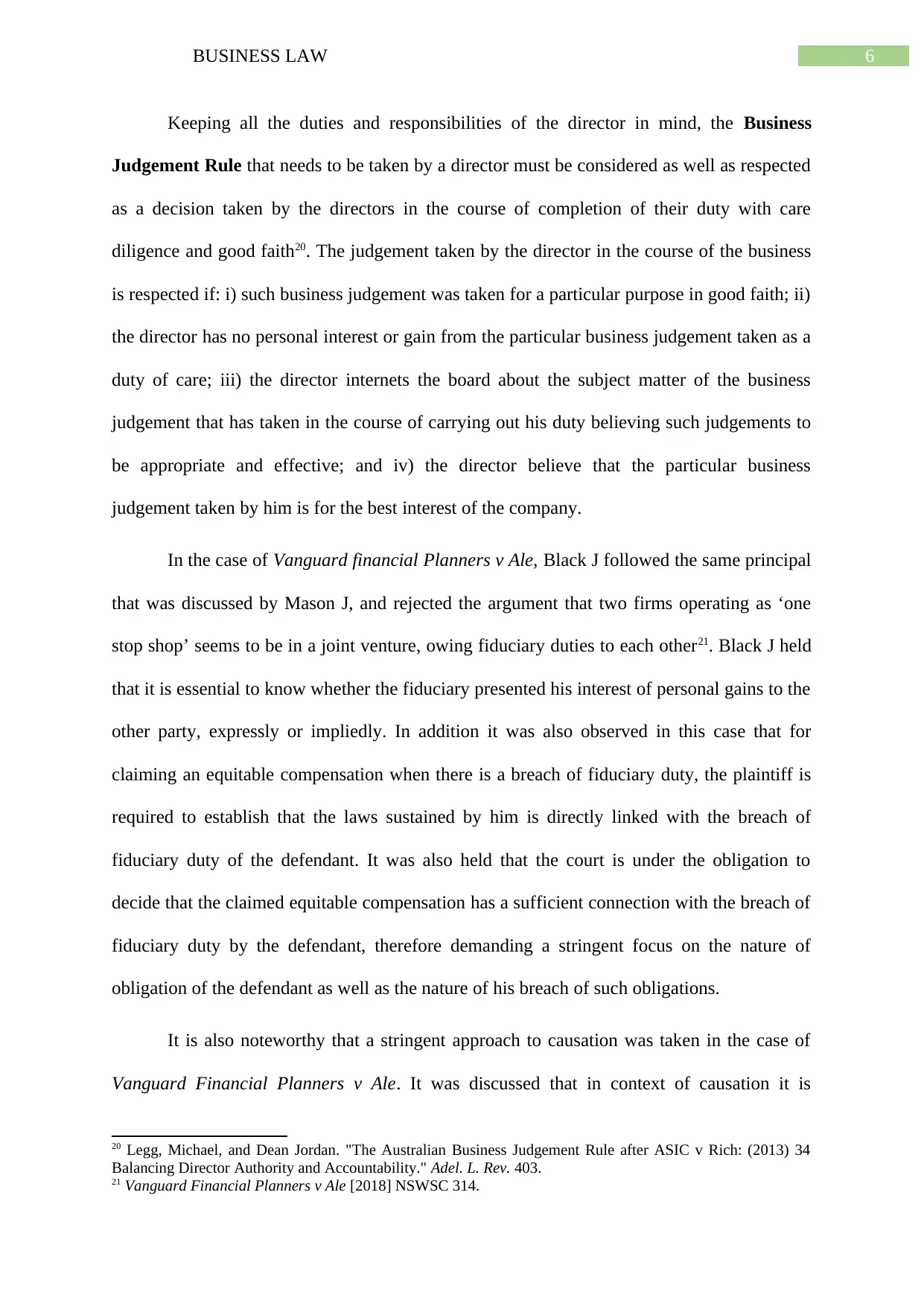
6BUSINESS LAW
Keeping all the duties and responsibilities of the director in mind, the Business
Judgement Rule that needs to be taken by a director must be considered as well as respected
as a decision taken by the directors in the course of completion of their duty with care
diligence and good faith20. The judgement taken by the director in the course of the business
is respected if: i) such business judgement was taken for a particular purpose in good faith; ii)
the director has no personal interest or gain from the particular business judgement taken as a
duty of care; iii) the director internets the board about the subject matter of the business
judgement that has taken in the course of carrying out his duty believing such judgements to
be appropriate and effective; and iv) the director believe that the particular business
judgement taken by him is for the best interest of the company.
In the case of Vanguard financial Planners v Ale, Black J followed the same principal
that was discussed by Mason J, and rejected the argument that two firms operating as ‘one
stop shop’ seems to be in a joint venture, owing fiduciary duties to each other21. Black J held
that it is essential to know whether the fiduciary presented his interest of personal gains to the
other party, expressly or impliedly. In addition it was also observed in this case that for
claiming an equitable compensation when there is a breach of fiduciary duty, the plaintiff is
required to establish that the laws sustained by him is directly linked with the breach of
fiduciary duty of the defendant. It was also held that the court is under the obligation to
decide that the claimed equitable compensation has a sufficient connection with the breach of
fiduciary duty by the defendant, therefore demanding a stringent focus on the nature of
obligation of the defendant as well as the nature of his breach of such obligations.
It is also noteworthy that a stringent approach to causation was taken in the case of
Vanguard Financial Planners v Ale. It was discussed that in context of causation it is
20 Legg, Michael, and Dean Jordan. "The Australian Business Judgement Rule after ASIC v Rich: (2013) 34
Balancing Director Authority and Accountability." Adel. L. Rev. 403.
21 Vanguard Financial Planners v Ale [2018] NSWSC 314.
Keeping all the duties and responsibilities of the director in mind, the Business
Judgement Rule that needs to be taken by a director must be considered as well as respected
as a decision taken by the directors in the course of completion of their duty with care
diligence and good faith20. The judgement taken by the director in the course of the business
is respected if: i) such business judgement was taken for a particular purpose in good faith; ii)
the director has no personal interest or gain from the particular business judgement taken as a
duty of care; iii) the director internets the board about the subject matter of the business
judgement that has taken in the course of carrying out his duty believing such judgements to
be appropriate and effective; and iv) the director believe that the particular business
judgement taken by him is for the best interest of the company.
In the case of Vanguard financial Planners v Ale, Black J followed the same principal
that was discussed by Mason J, and rejected the argument that two firms operating as ‘one
stop shop’ seems to be in a joint venture, owing fiduciary duties to each other21. Black J held
that it is essential to know whether the fiduciary presented his interest of personal gains to the
other party, expressly or impliedly. In addition it was also observed in this case that for
claiming an equitable compensation when there is a breach of fiduciary duty, the plaintiff is
required to establish that the laws sustained by him is directly linked with the breach of
fiduciary duty of the defendant. It was also held that the court is under the obligation to
decide that the claimed equitable compensation has a sufficient connection with the breach of
fiduciary duty by the defendant, therefore demanding a stringent focus on the nature of
obligation of the defendant as well as the nature of his breach of such obligations.
It is also noteworthy that a stringent approach to causation was taken in the case of
Vanguard Financial Planners v Ale. It was discussed that in context of causation it is
20 Legg, Michael, and Dean Jordan. "The Australian Business Judgement Rule after ASIC v Rich: (2013) 34
Balancing Director Authority and Accountability." Adel. L. Rev. 403.
21 Vanguard Financial Planners v Ale [2018] NSWSC 314.
Paraphrase This Document
Need a fresh take? Get an instant paraphrase of this document with our AI Paraphraser
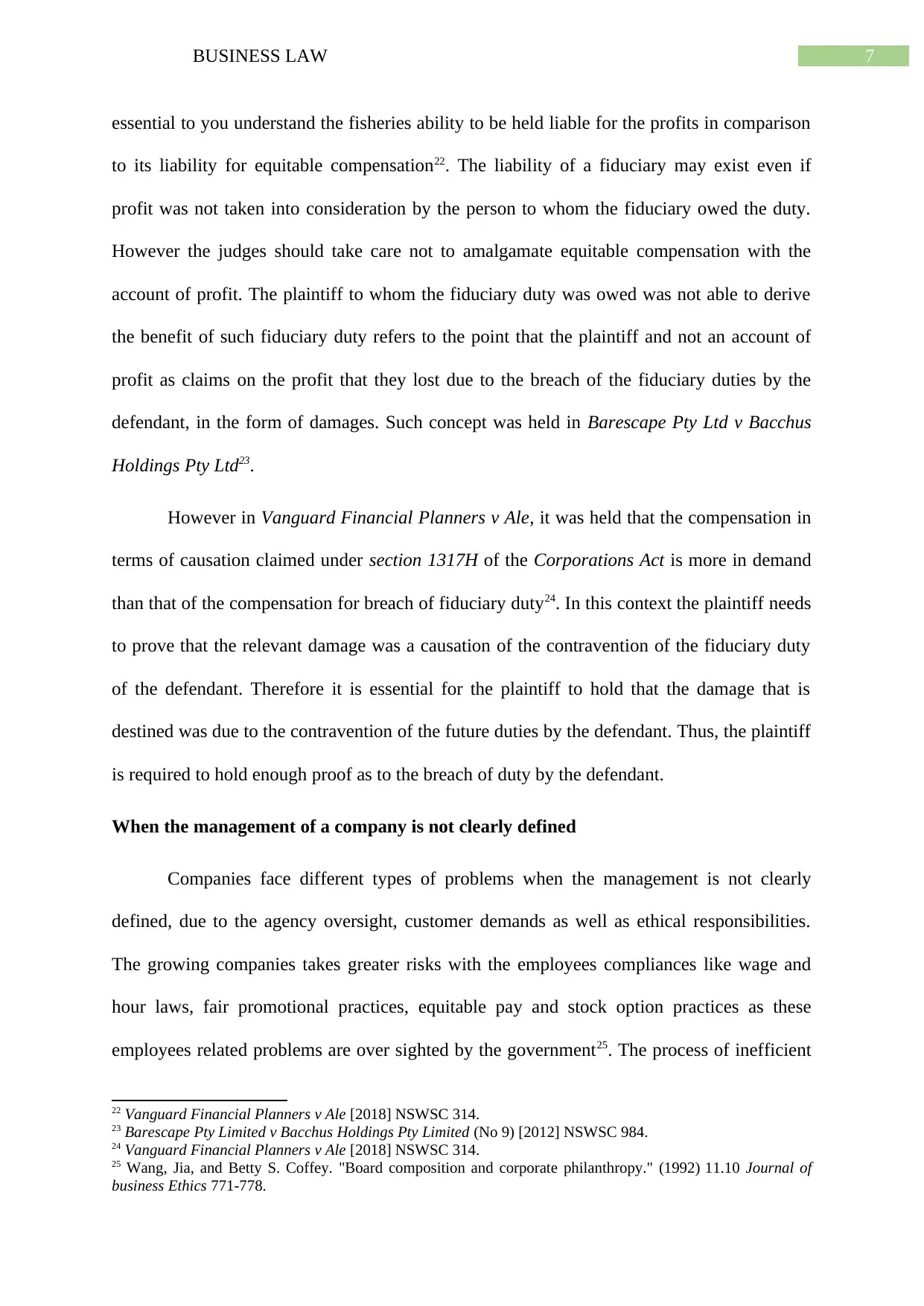
7BUSINESS LAW
essential to you understand the fisheries ability to be held liable for the profits in comparison
to its liability for equitable compensation22. The liability of a fiduciary may exist even if
profit was not taken into consideration by the person to whom the fiduciary owed the duty.
However the judges should take care not to amalgamate equitable compensation with the
account of profit. The plaintiff to whom the fiduciary duty was owed was not able to derive
the benefit of such fiduciary duty refers to the point that the plaintiff and not an account of
profit as claims on the profit that they lost due to the breach of the fiduciary duties by the
defendant, in the form of damages. Such concept was held in Barescape Pty Ltd v Bacchus
Holdings Pty Ltd23.
However in Vanguard Financial Planners v Ale, it was held that the compensation in
terms of causation claimed under section 1317H of the Corporations Act is more in demand
than that of the compensation for breach of fiduciary duty24. In this context the plaintiff needs
to prove that the relevant damage was a causation of the contravention of the fiduciary duty
of the defendant. Therefore it is essential for the plaintiff to hold that the damage that is
destined was due to the contravention of the future duties by the defendant. Thus, the plaintiff
is required to hold enough proof as to the breach of duty by the defendant.
When the management of a company is not clearly defined
Companies face different types of problems when the management is not clearly
defined, due to the agency oversight, customer demands as well as ethical responsibilities.
The growing companies takes greater risks with the employees compliances like wage and
hour laws, fair promotional practices, equitable pay and stock option practices as these
employees related problems are over sighted by the government25. The process of inefficient
22 Vanguard Financial Planners v Ale [2018] NSWSC 314.
23 Barescape Pty Limited v Bacchus Holdings Pty Limited (No 9) [2012] NSWSC 984.
24 Vanguard Financial Planners v Ale [2018] NSWSC 314.
25 Wang, Jia, and Betty S. Coffey. "Board composition and corporate philanthropy." (1992) 11.10 Journal of
business Ethics 771-778.
essential to you understand the fisheries ability to be held liable for the profits in comparison
to its liability for equitable compensation22. The liability of a fiduciary may exist even if
profit was not taken into consideration by the person to whom the fiduciary owed the duty.
However the judges should take care not to amalgamate equitable compensation with the
account of profit. The plaintiff to whom the fiduciary duty was owed was not able to derive
the benefit of such fiduciary duty refers to the point that the plaintiff and not an account of
profit as claims on the profit that they lost due to the breach of the fiduciary duties by the
defendant, in the form of damages. Such concept was held in Barescape Pty Ltd v Bacchus
Holdings Pty Ltd23.
However in Vanguard Financial Planners v Ale, it was held that the compensation in
terms of causation claimed under section 1317H of the Corporations Act is more in demand
than that of the compensation for breach of fiduciary duty24. In this context the plaintiff needs
to prove that the relevant damage was a causation of the contravention of the fiduciary duty
of the defendant. Therefore it is essential for the plaintiff to hold that the damage that is
destined was due to the contravention of the future duties by the defendant. Thus, the plaintiff
is required to hold enough proof as to the breach of duty by the defendant.
When the management of a company is not clearly defined
Companies face different types of problems when the management is not clearly
defined, due to the agency oversight, customer demands as well as ethical responsibilities.
The growing companies takes greater risks with the employees compliances like wage and
hour laws, fair promotional practices, equitable pay and stock option practices as these
employees related problems are over sighted by the government25. The process of inefficient
22 Vanguard Financial Planners v Ale [2018] NSWSC 314.
23 Barescape Pty Limited v Bacchus Holdings Pty Limited (No 9) [2012] NSWSC 984.
24 Vanguard Financial Planners v Ale [2018] NSWSC 314.
25 Wang, Jia, and Betty S. Coffey. "Board composition and corporate philanthropy." (1992) 11.10 Journal of
business Ethics 771-778.
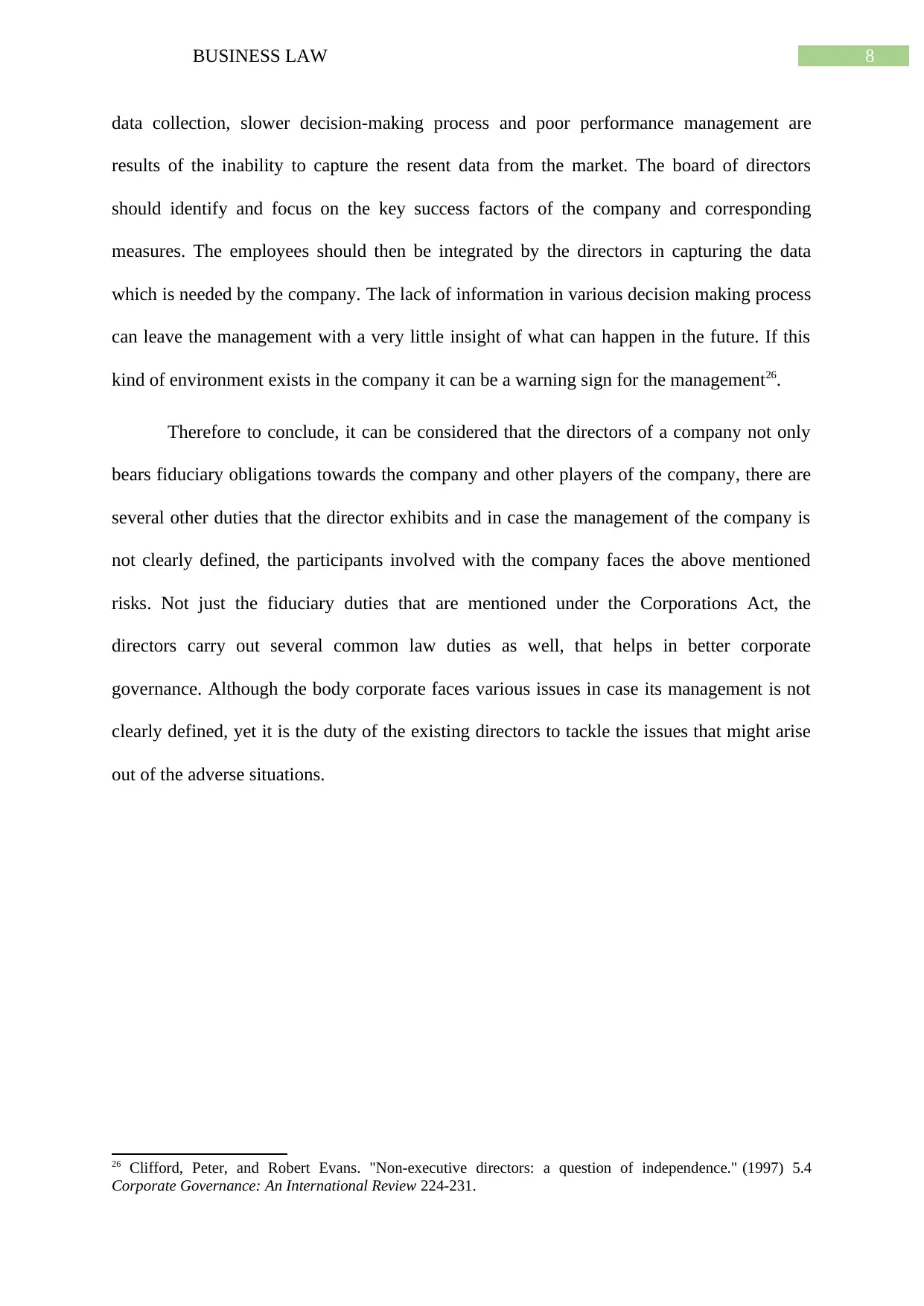
8BUSINESS LAW
data collection, slower decision-making process and poor performance management are
results of the inability to capture the resent data from the market. The board of directors
should identify and focus on the key success factors of the company and corresponding
measures. The employees should then be integrated by the directors in capturing the data
which is needed by the company. The lack of information in various decision making process
can leave the management with a very little insight of what can happen in the future. If this
kind of environment exists in the company it can be a warning sign for the management26.
Therefore to conclude, it can be considered that the directors of a company not only
bears fiduciary obligations towards the company and other players of the company, there are
several other duties that the director exhibits and in case the management of the company is
not clearly defined, the participants involved with the company faces the above mentioned
risks. Not just the fiduciary duties that are mentioned under the Corporations Act, the
directors carry out several common law duties as well, that helps in better corporate
governance. Although the body corporate faces various issues in case its management is not
clearly defined, yet it is the duty of the existing directors to tackle the issues that might arise
out of the adverse situations.
26 Clifford, Peter, and Robert Evans. "Non‐executive directors: a question of independence." (1997) 5.4
Corporate Governance: An International Review 224-231.
data collection, slower decision-making process and poor performance management are
results of the inability to capture the resent data from the market. The board of directors
should identify and focus on the key success factors of the company and corresponding
measures. The employees should then be integrated by the directors in capturing the data
which is needed by the company. The lack of information in various decision making process
can leave the management with a very little insight of what can happen in the future. If this
kind of environment exists in the company it can be a warning sign for the management26.
Therefore to conclude, it can be considered that the directors of a company not only
bears fiduciary obligations towards the company and other players of the company, there are
several other duties that the director exhibits and in case the management of the company is
not clearly defined, the participants involved with the company faces the above mentioned
risks. Not just the fiduciary duties that are mentioned under the Corporations Act, the
directors carry out several common law duties as well, that helps in better corporate
governance. Although the body corporate faces various issues in case its management is not
clearly defined, yet it is the duty of the existing directors to tackle the issues that might arise
out of the adverse situations.
26 Clifford, Peter, and Robert Evans. "Non‐executive directors: a question of independence." (1997) 5.4
Corporate Governance: An International Review 224-231.
⊘ This is a preview!⊘
Do you want full access?
Subscribe today to unlock all pages.

Trusted by 1+ million students worldwide
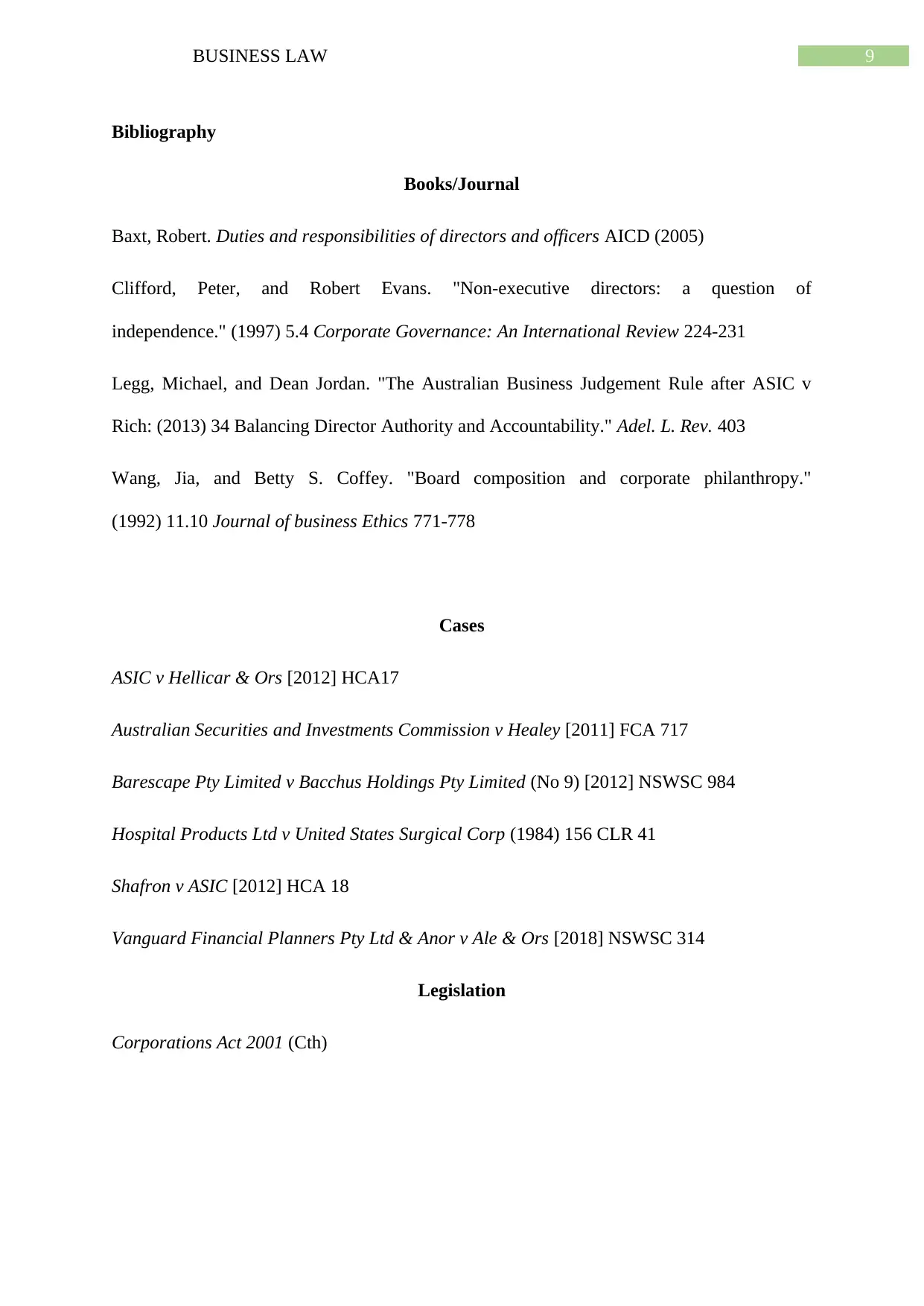
9BUSINESS LAW
Bibliography
Books/Journal
Baxt, Robert. Duties and responsibilities of directors and officers AICD (2005)
Clifford, Peter, and Robert Evans. "Non‐executive directors: a question of
independence." (1997) 5.4 Corporate Governance: An International Review 224-231
Legg, Michael, and Dean Jordan. "The Australian Business Judgement Rule after ASIC v
Rich: (2013) 34 Balancing Director Authority and Accountability." Adel. L. Rev. 403
Wang, Jia, and Betty S. Coffey. "Board composition and corporate philanthropy."
(1992) 11.10 Journal of business Ethics 771-778
Cases
ASIC v Hellicar & Ors [2012] HCA17
Australian Securities and Investments Commission v Healey [2011] FCA 717
Barescape Pty Limited v Bacchus Holdings Pty Limited (No 9) [2012] NSWSC 984
Hospital Products Ltd v United States Surgical Corp (1984) 156 CLR 41
Shafron v ASIC [2012] HCA 18
Vanguard Financial Planners Pty Ltd & Anor v Ale & Ors [2018] NSWSC 314
Legislation
Corporations Act 2001 (Cth)
Bibliography
Books/Journal
Baxt, Robert. Duties and responsibilities of directors and officers AICD (2005)
Clifford, Peter, and Robert Evans. "Non‐executive directors: a question of
independence." (1997) 5.4 Corporate Governance: An International Review 224-231
Legg, Michael, and Dean Jordan. "The Australian Business Judgement Rule after ASIC v
Rich: (2013) 34 Balancing Director Authority and Accountability." Adel. L. Rev. 403
Wang, Jia, and Betty S. Coffey. "Board composition and corporate philanthropy."
(1992) 11.10 Journal of business Ethics 771-778
Cases
ASIC v Hellicar & Ors [2012] HCA17
Australian Securities and Investments Commission v Healey [2011] FCA 717
Barescape Pty Limited v Bacchus Holdings Pty Limited (No 9) [2012] NSWSC 984
Hospital Products Ltd v United States Surgical Corp (1984) 156 CLR 41
Shafron v ASIC [2012] HCA 18
Vanguard Financial Planners Pty Ltd & Anor v Ale & Ors [2018] NSWSC 314
Legislation
Corporations Act 2001 (Cth)
Paraphrase This Document
Need a fresh take? Get an instant paraphrase of this document with our AI Paraphraser
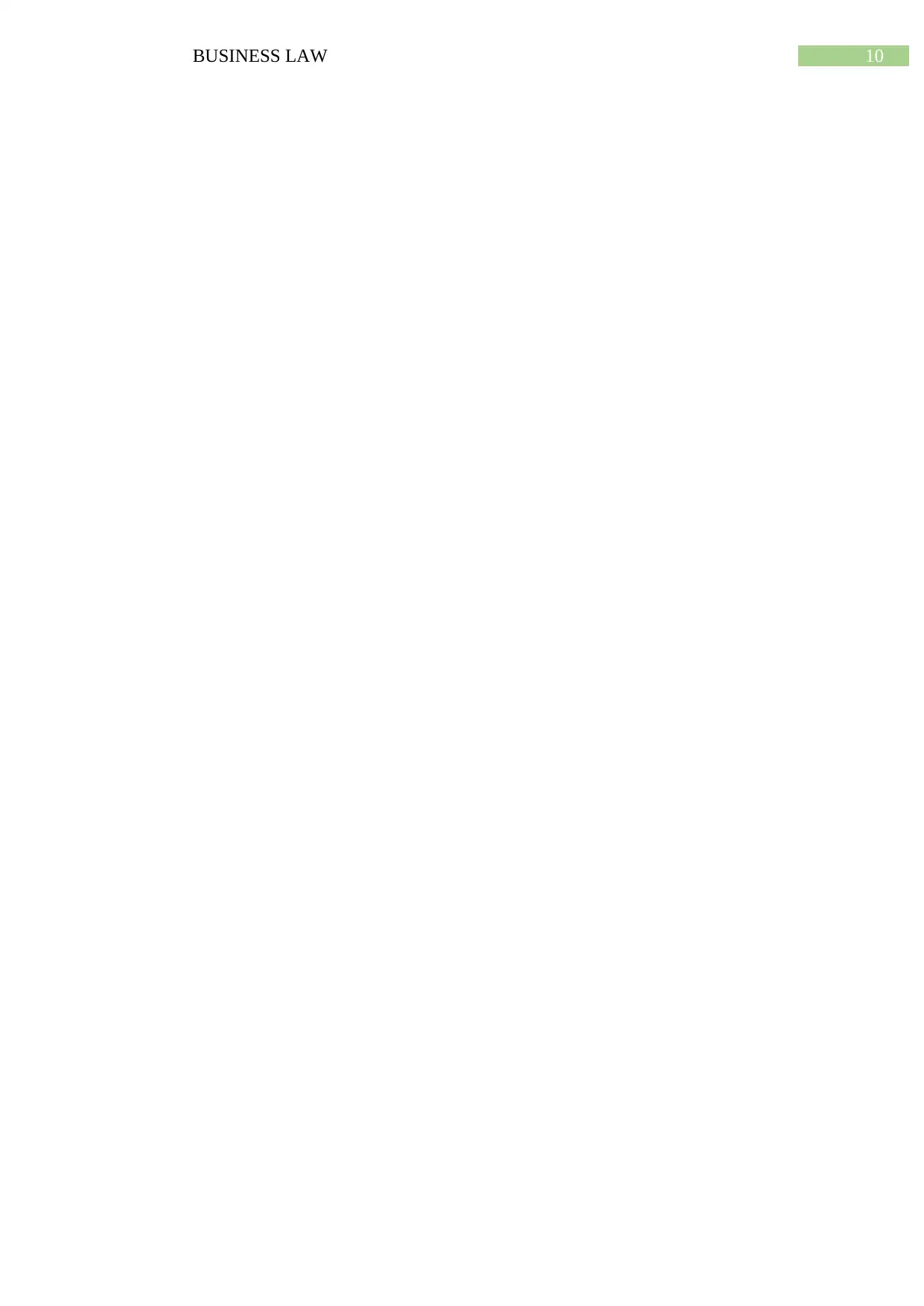
10BUSINESS LAW
1 out of 11
Related Documents
Your All-in-One AI-Powered Toolkit for Academic Success.
+13062052269
info@desklib.com
Available 24*7 on WhatsApp / Email
![[object Object]](/_next/static/media/star-bottom.7253800d.svg)
Unlock your academic potential
Copyright © 2020–2026 A2Z Services. All Rights Reserved. Developed and managed by ZUCOL.





